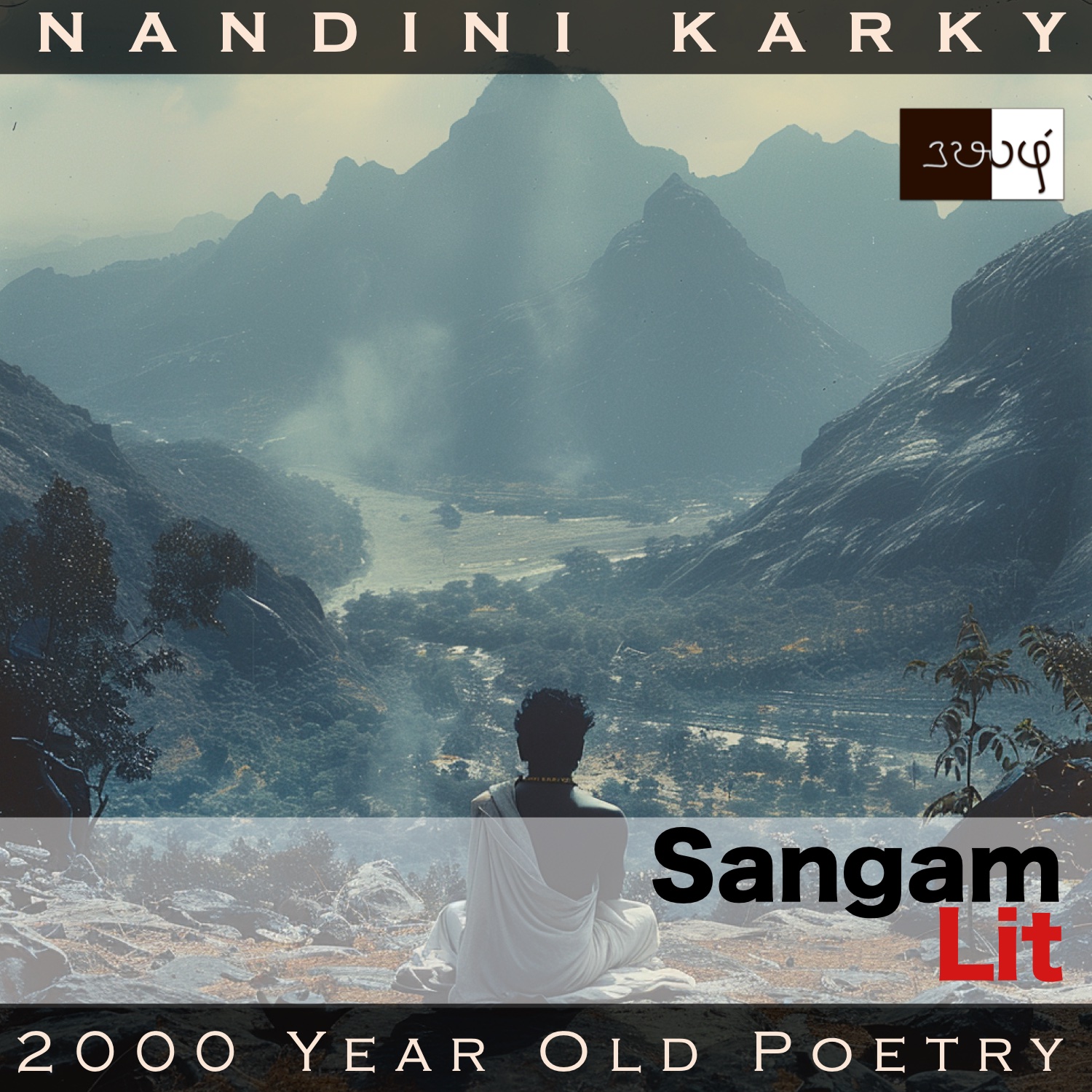Podcast: Play in new window | Download
Subscribe: Apple Podcasts | Spotify | Amazon Music | Android | iHeartRadio | TuneIn | RSS | More
In this episode, we hear the lament of a poet, as depicted in Sangam Literary work, Puranaanooru 375, penned for the Velir King Aay Andiran by the poet Uraiyoor Enicheri Mudamosiyaar. Set in the category of ‘Paadaan Thinai’ or ‘Praise’, the verse spotlights the generosity of this king in the contrast of a barren background.

அலங்கு கதிர் சுமந்த கலங்கற் சூழி,
நிலைதளர்வு தொலைந்த ஒல்கு நிலைப் பல் காற்
பொதியில் ஒரு சிறை பள்ளி ஆக,
முழாஅரைப் போந்தை அர வாய் மா மடல்
நாரும் போழும் கிணையொடு சுருக்கி,
ஏரின் வாழ்நர் குடிமுறை புகாஅ,
‘ஊழ் இரந்து உண்ணும் உயவல் வாழ்வைப்
புரவு எதிர்ந்து கொள்ளும் சான்றோர் யார்?’ எனப்
பிரசம் தூங்கும் அறாஅ யாணர்,
வரையணி படப்பை நன்னாட்டுப் பொருந!
பொய்யா ஈகைக் கழல் தொடி ஆஅய்!
யாவரும் இன்மையின் கிணைப்ப, தாவது,
பெரு மழை கடல் பரந்தாஅங்கு, யானும்
ஒரு நின் உள்ளி வந்தனென்; அதனால்
புலவர் புக்கில் ஆகி, நிலவரை
நிலீஇயர் அத்தை, நீயே! ஒன்றே
நின் இன்று வறுவிது ஆகிய உலகத்து,
நிலவன்மாரோ, புரவலர்! துன்னி,
பெரிய ஓதினும் சிறிய உணராப்
பீடு இன்று பெருகிய திருவின்,
பாடு இல் மன்னரைப் பாடன்மார், எமரே!
A verse that celebrates the virtues of this Velir king and says something significant about a code of honour! The poet’s words can be translated as follows:
“Akin to a muddy reservoir filled with floating stalks, with their shapes ruined, in an unsteady state, stand many columns of the village centre, whose cracked floor happens to be my bed. Taking huge leaves, fibres and shoots of the palmyra tree with a drum-like base, and tying all that along with my ‘kinai’ drum, I approach the community of those, who live by the plough and accept whatever they can offer, as per their custom. Wondering, ‘Who could be the noble people who would render the right reward and end this suffering-filled life, where I have to beg for my food?’, I came to your fine country, filled with hanging honeycombs, unending prosperity and mountain groves, O King Aay, the one wearing warrior armlets and having unceasing generosity! Seeing that I had no one to appreciate the music of my ‘Kinai’ drum, without hesitating, just as how huge clouds rush to the seas, I too came here, thinking of you. May you continue to remain the refuge of poets and live for long upon this earth; In a world with no one like you, how can supplicants live anymore? Even though we go close, and say a lot, they feel not, even a little. Such is the attitude of those kings, who have plenty of wealth but no fame and honour! My kind shall never sing of such kings, O lord!”
Let’s explore the thoughts presented here. The poet begins by talking about a tank that is all muddied, filled with dead branches and leaves, floating on its surface. This ruined state of the once clear waters of this tank is placed in parallel to the loosened and displaced columns of the hall in a town centre, and the poet says that it’s on the broken floors of such a place that he used to sleep. He talks about how he took the many useful parts of a palmyra tree, and he tied them with his ‘Kinai’ drum. What is the significance of collecting palm leaves and shoots and placing it with a musical drum, a reference we have already seen once or twice? That’s not evident, but the poet continues saying how he then walks towards the houses of those who live by the plough, meaning the farmers, and there, he begs for food, and they give what they can, according to their tradition.
The poet is saddened by this state of begging for his food, having no one to appreciate his art, and then the country of this king comes to his mind. It’s a fertile mountain land, where honeycombs hang everywhere, and there are lush mountain groves and symbols of great fertility all around, the poet details, as he sings these praises to the ruler of this land, King Aay! Presenting the relevant simile of the way clouds rush to the seas to fill themselves with water, the poet says that’s the certainty with which he came to this king, and requests the king to always remain such an unwavering refuge to poets and supplicants, wishing him a long life.
Next, the poet declares that in a world where there’s no one like this king, supplicants cannot survive anymore. He then says no matter how well poets approach them and sing with fervour, there are certain people who are absolutely not moved at all. They are the kings, who are now becoming ubiquitous, the ones who have nothing to be sung about, no fame and honour, but merely possess copious wealth. Our poet concludes by declaring that poets like him would never debase themselves singing of such kings!
We can understand the honour of these poets as well as their expectations from their patrons in this verse. It was not enough to just have possessions and power, but to be a patron, one must be moved by the words and music of these artists, which was not happening any more, the poet declares. Could this verse be a historical record of the changing times when the Sangam era was starting to decline and the culture of celebrating art was eroding? Highly likely! When kings are focussed only on accumulating wealth, and there’s no one to celebrate the work of such poets, then won’t art slowly die, and so too, culture? Perhaps that’s what the poet is talking about in the latter part of the verse, even as he celebrates this mountain king as the last of the great that lived then!




Share your thoughts...